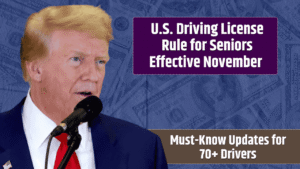Join on WhatsApp
Get the latest updates directly on WhatsApp – motivation, news & more!
Come October 2025, older drivers in the U.S. will step into a new era of licensing. The Department of Transportation (DOT) has finalized a framework that changes how seniors aged 70 and up renew their driver’s licenses. The aim is clear: boost road safety without stripping away independence from millions of Americans who still rely on their cars for daily life.
Why the Rules Are Changing
The numbers tell the story. Nearly 48 million Americans over 65 currently hold driver’s licenses, according to Federal Highway Administration data. And by the mid-2030s, Census Bureau projections show seniors will outnumber children in the U.S. As the senior driving population swells, so do concerns about reaction time, vision, and medical conditions that can affect safety.
Rather than leaving each state to its own patchwork of rules, the DOT’s October 2025 rollout creates a consistent nationwide framework—while still letting states adapt details to local needs.
How the New Tiered System Works
Instead of a one-size-fits-all model, the framework introduces stricter renewal requirements as drivers age. Here’s how it breaks down:
| Age Group | Renewal Frequency | Testing Requirements |
|---|---|---|
| 70–79 | Every 4 years | Vision test at each renewal |
| 80–86 | Every 2 years | Vision + cognitive screening if flagged |
| 87+ | Every year | Mandatory road test + medical clearance if needed |
No one is automatically disqualified purely due to age. The focus is ability, not birthdate.
Who Can Flag a Concern
If there are red flags about a senior driver’s safety, multiple parties can raise them:
- Family members who notice unsafe driving habits
- Doctors concerned about medical conditions
- Law enforcement after traffic stops or accidents
The DMV then decides whether a medical review or behind-the-wheel reassessment is needed. It’s not about yanking the license immediately—it’s about evaluating fairly.
State Flexibility Still Matters
Though it’s a federal framework, states retain wiggle room. A few examples emerging already:
- California plans to integrate telehealth options for medical certifications.
- Florida may add mandatory reaction-time screenings starting at age 80.
- New York is considering subsidies for driver refresher courses to help seniors pass renewals.
For the most accurate local rules, drivers should check their state DMV page at usa.gov/motor-vehicle-services.
Preparing for October 2025
Seniors and families don’t have to wait for surprise letters from the DMV. Experts recommend:
- Schedule regular eye exams to avoid last-minute test failures.
- Keep medical records up to date, especially for conditions like diabetes or epilepsy.
- Brush up on driving skills with defensive driving or refresher courses.
- Talk openly with family about when it may be time to scale back driving.
Restricted Licenses: A Middle Ground
Not every case leads to a full suspension. If risks are present but manageable, restricted licenses may be issued. These could limit drivers to:
- Daytime driving only
- Local trips within a set radius
- Non-highway routes
- Driving with a passenger present
This keeps seniors mobile while lowering accident risks.
Beyond the Wheel: Alternative Options
For seniors who step back from driving, mobility doesn’t have to vanish. Cities are expanding:
- Ride-share partnerships with discounts for seniors
- On-demand shuttle programs in suburban and rural areas
- Volunteer driver networks for medical appointments and errands
These alternatives help soften the transition away from full-time driving.
FAQs
When do the new rules take effect?
They’re scheduled to start in October 2025.
Will all seniors need to take a road test?
No. Road tests only become mandatory at age 87 and above.
What’s required for drivers in their 70s?
A vision test at each renewal, typically every 4 years.
Can states make the rules stricter than the federal baseline?
Yes. States can add extra requirements, but they can’t go below the minimum standards.
Will restricted licenses be an option everywhere?
Yes, though conditions (like mileage or time limits) will vary by state DMV policies.




